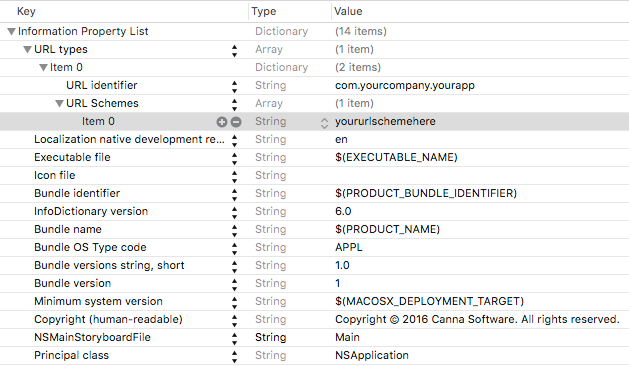My goal is to create an extension that executes clang-format. My code looks something like this:
- (void)performCommandWithInvocation:(XCSourceEditorCommandInvocation *)invocation completionHandler:(void (^)(NSError * _Nullable nilOrError))completionHandler
{
NSError *error = nil;
NSURL *executableURL = [[self class] executableURL];
if (!executableURL)
{
NSString *errorDescription = [NSString stringWithFormat:@"Failed to find clang-format. Ensure it is installed at any of these locations\n%@", [[self class] clangFormatUrls]];
completionHandler([NSError errorWithDomain:SourceEditorCommandErrorDomain
code:1
userInfo:@{NSLocalizedDescriptionKey: errorDescription}]);
return;
}
NSMutableArray *args = [NSMutableArray array];
[args addObject:@"-style=LLVM"];
[args addObject:@"someFile.m"];
NSPipe *outputPipe = [NSPipe pipe];
NSPipe *errorPipe = [NSPipe pipe];
NSTask *task = [[NSTask alloc] init];
task.launchPath = executableURL.path;
task.arguments = args;
task.standardOutput = outputPipe;
task.standardError = errorPipe;
@try
{
[task launch];
}
@catch (NSException *exception)
{
completionHandler([NSError errorWithDomain:SourceEditorCommandErrorDomain
code:2
userInfo:@{NSLocalizedDescriptionKey: [NSString stringWithFormat:@"Failed to run clang-format: %@", exception.reason]}]);
return;
}
[task waitUntilExit];
NSString *output = [[NSString alloc] initWithData:[[outputPipe fileHandleForReading] readDataToEndOfFile]
encoding:NSUTF8StringEncoding];
NSString *errorOutput = [[NSString alloc] initWithData:[[errorPipe fileHandleForReading] readDataToEndOfFile]
encoding:NSUTF8StringEncoding];
[[outputPipe fileHandleForReading] closeFile];
[[errorPipe fileHandleForReading] closeFile];
int status = [task terminationStatus];
if (status == 0)
{
NSLog(@"Success: %@", output);
}
else
{
error = [NSError errorWithDomain:SourceEditorCommandErrorDomain
code:3
userInfo:@{NSLocalizedDescriptionKey: errorOutput}];
}
completionHandler(error);
}
The reason I need that try-catch block is because an exception is thrown when I try to run this code. The exception reason is:
Error: launch path not accessible
The path for my clang-format is /usr/local/bin/clang-format. What I discovered is that it doesn't like me trying to access an application in /usr/local/bin, but /bin is ok (e.g. If I try to execute /bin/ls there is no problem).
Another solution I tried was to run /bin/bash by setting the launch path and arguments like this:
task.launchPath = [[[NSProcessInfo processInfo] environment] objectForKey:@"SHELL"];
task.arguments = @[@"-l", @"-c", @"/usr/local/bin/clang-format -style=LLVM someFile.m"];
This successfully launches the task, but it fails with the following error output:
/bin/bash: /etc/profile: Operation not permitted /bin/bash: /usr/local/bin/clang-format: Operation not permitted
The first error message is due to trying to call the -l parameter in bash, which tries to log in as the user.
Any idea how I can enable access to those other folders? Is there some kind of sandbox environment setting I need to enable?

